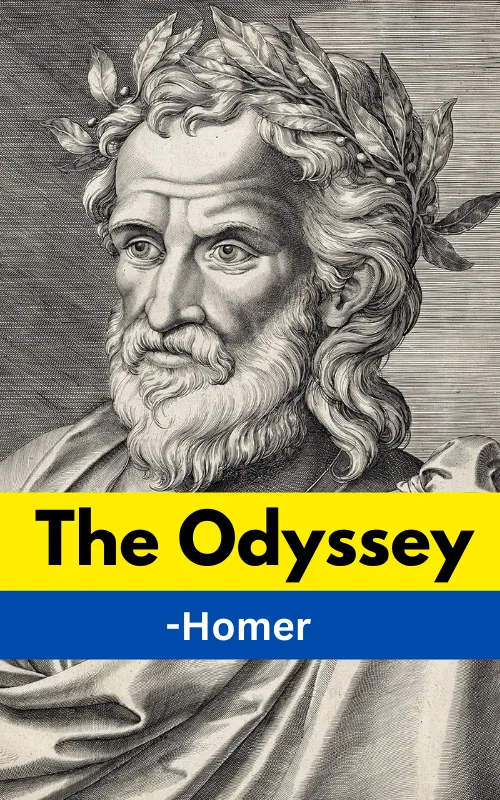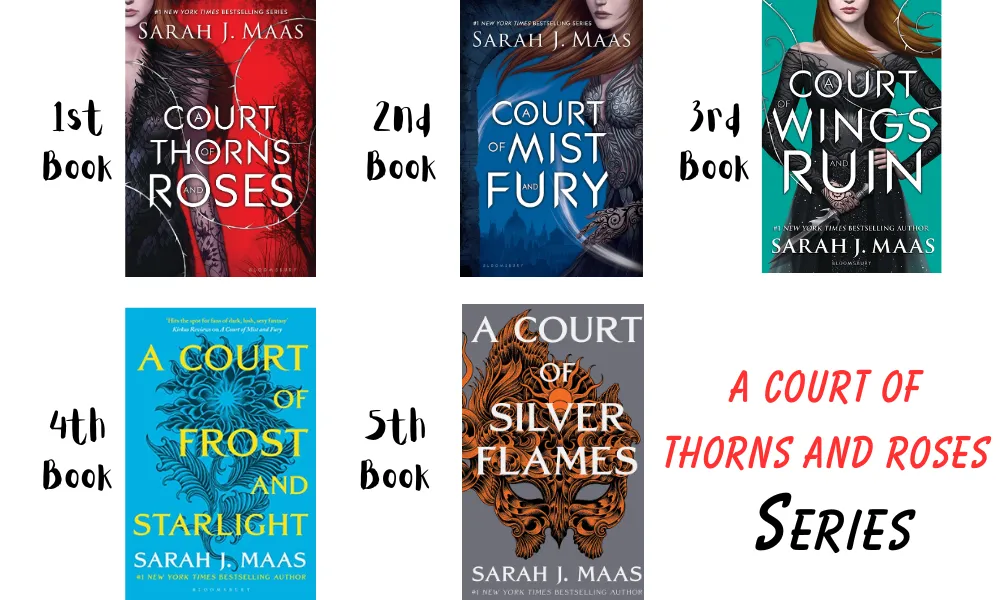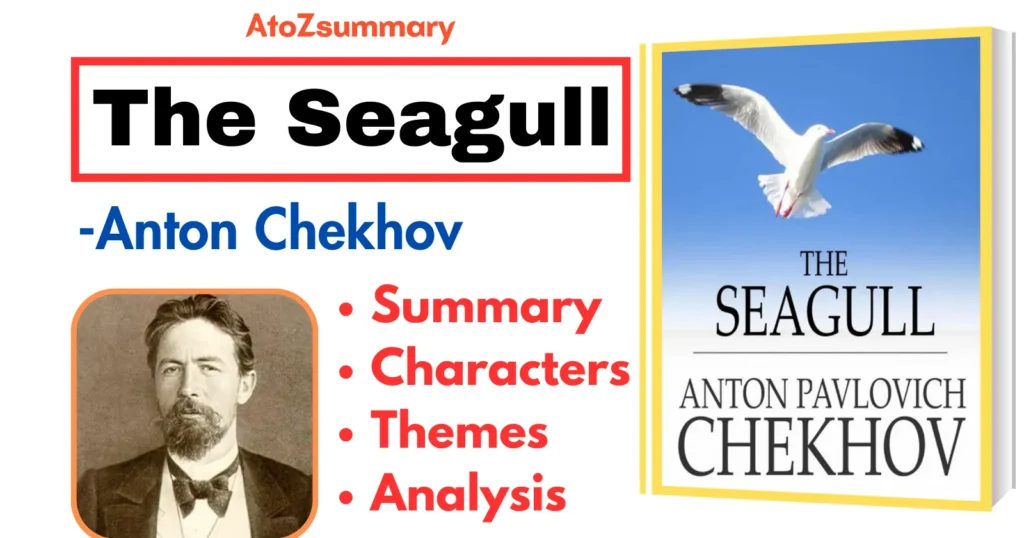About Poem: The Odyssey
| Poem Title | The Odyssey |
| Author | Homer |
| Date | 8th century BCE |
| Form | Epic poem |
| Structure | Comprises 24 books (chapters) |
| Genre | Epic, mythology |
| Setting | Ancient Greece, primarily Ithaca and the Mediterranean |
Themes: The Odyssey
The themes of “The Odyssey” by Homer are:
- Hero’s Journey ➤ Follows the adventures and trials of the hero Odysseus as he strives to return home.
- Cleverness and Cunning ➤ Shows how intelligence and wit can overcome obstacles.
- Loyalty and Perseverance ➤ Highlights the importance of remaining faithful and persistent, even in the face of adversity.
- The Power of Fate ➤ Explores the idea that destiny plays a significant role in human lives.
Characters: The Odyssey
The characters from “The Odyssey” by Homer:
- Odysseus ➤ The hero and protagonist, he’s a clever and brave Greek warrior trying to return home.
- Penelope ➤ Odysseus’ wife, known for her loyalty and wit.
- Telemachus ➤ Odysseus and Penelope’s son, who seeks his father and matures throughout the epic.
- Athena ➤ The goddess of wisdom and warfare, who supports Odysseus.
- Poseidon ➤ The sea god who opposes Odysseus and makes his journey home difficult.
- Circe ➤ A sorceress who turns Odysseus’ crew into swine.
- Calypso ➤ A nymph who keeps Odysseus on her island for years.
- Polyphemus ➤ A Cyclops who imprisons Odysseus and his crew.
- Nausicaa ➤ A Phaeacian princess who helps Odysseus when he washes ashore.
- Sirens, Scylla, and Charybdis ➤ Mythical creatures and dangers encountered by Odysseus on his journey.
The Odyssey Poem Summary & Analysis
Book 1
The poem opens with Odysseus stranded on the island of Ogygia, under the captivity of the enchanting nymph Calypso. The gods gather to discuss his fate, with Athena advocating for his release. Meanwhile, Telemachus, Odysseus’ son, is searching for information about his father’s whereabouts. He is visited by Athena, who encourages him to embark on a quest to learn about his father and establish his own reputation.
Book 2
Telemachus seeks support from the assembly of Ithaca, addressing the suitors who have overrun his home and are pressuring his mother, Penelope, to remarry. He announces his intentions to embark on a journey to find information about his father, and a ship and crew are prepared for him.
Book 3
Telemachus arrives in Pylos, where he seeks the wisdom of Nestor, an old comrade of Odysseus. Nestor is unable to provide concrete information about Odysseus’ fate but directs Telemachus to King Menelaus in Sparta, who may have more knowledge.
Book 4
Telemachus arrives in Sparta and is welcomed by Menelaus and Helen. Menelaus recounts the story of his adventures on the way back from Troy and reveals that Odysseus is being held captive by the nymph Calypso. Telemachus gains valuable information about his father.
Book 5
The gods, convened on Mount Olympus, decide that it is time for Odysseus to be released from Calypso’s captivity. Hermes is dispatched to Ogygia, where he convinces Calypso to release Odysseus. She reluctantly agrees and provides him with the means to build a raft and escape.
Book 6
Odysseus sets sail on his raft and, after facing perilous trials, arrives on the island of Scheria, home of the Phaeacians. There, he is found by Princess Nausicaa, who provides him with clothing and guidance to the Phaeacian king, Alcinous.
Book 7
In the court of King Alcinous, Odysseus is welcomed with hospitality and is asked to recount his adventures. He shares the tale of his journey from Troy, revealing his heroic deeds, his encounters with the Cyclops Polyphemus and the sorceress Circe, and his year-long stay with Calypso.
Book 8
Odysseus’ storytelling continues, recounting his departure from Calypso’s island and the trials faced at sea. The Phaeacians are deeply moved by his story, and King Alcinous promises to help him return to Ithaca.
Book 9
Odysseus narrates his encounter with the Cyclops Polyphemus. He and his men are trapped in the Cyclops’ cave and manage to escape by blinding Polyphemus. However, this act angers the Cyclops’ father, Poseidon, who becomes Odysseus’ relentless enemy.
Book 10
Odysseus and his men sail to the island of Aeolia, where the wind king, Aeolus, gifts them with a bag of winds to aid their journey. However, due to a crew member’s curiosity, the winds are released, driving them back to Aeolia. Aeolus, believing they are cursed, refuses to help again.
Book 11
Odysseus and his crew arrive on the island of the Laestrygonians, where giant cannibals attack their ships. Only Odysseus’s ship escapes. They proceed to the land of the dead, where Odysseus summons the spirits of the deceased, including the blind seer Tiresias. He receives prophecies and guidance.
Book 12
Odysseus and his remaining crew pass the dangerous Sirens, navigate the treacherous whirlpool of Charybdis and evade the man-eating monster Scylla. However, they land on the island of Thrinacia, where the men, against Odysseus’ warning, kill the sacred cattle of the sun god Helios.
Book 13
Zeus punishes Odysseus and his crew with a shipwreck, resulting in the loss of all his men except himself. Odysseus drifts to the island of Ogygia, where he is found by the Phaeacians.
Book 14
Odysseus is welcomed by the Phaeacians and recounts his adventures once more. He reaches the climax of his narrative, leading up to the present moment.
Book 15
The Phaeacians promise to help Odysseus return to Ithaca. They provide him with gifts, and he sets sail on their ship, arriving in Ithaca while he is asleep.
Book 16
Telemachus returns to Ithaca and receives the hospitality of Eumaeus, a loyal swineherd. Meanwhile, Odysseus, still in disguise, arrives at Eumaeus’ hut. Their paths are about to intersect, but the recognition is delayed.
Book 17
Odysseus, still disguised as a beggar, meets Telemachus and reveals his true identity only to him. The reunion between father and son is emotionally charged.
Book 18
The suitors, threatened by the beggar’s abilities, attempt to string Odysseus’s great bow, which only he can do. Odysseus, revealing his identity, succeeds in stringing the bow and shooting an arrow through twelve axeheads, proving his true self.
Book 19
Telemachus and Odysseus secure the palace doors and prepare for a showdown with the suitors. Meanwhile, Penelope brings Odysseus’s rags to him, which stirs his emotions as they hold memories of his past.
Book 20
Odysseus, still in disguise, enters the palace and is tested by Penelope. She presents him with a challenge involving their bed, the only detail Odysseus knows. He successfully proves his identity, and Penelope rejoices.
Book 21
The suitors’ deaths continue as Odysseus and Telemachus, with the support of Athena, take control of the palace. They cleanse the house of disloyalty and treachery, restoring order.
Book 22
Odysseus confronts the ringleader of the suitors, Antinous, and kills him. The remaining suitors are terrified, and Odysseus spares only the minstrel Phemios and the herald Medon. The suitors’ deaths are a satisfying conclusion to their years of disloyalty and arrogance.
Book 23
Odysseus is finally reunited with Penelope. He tests her loyalty by describing their bed, which he explains is immovable. She recognizes him and they embrace, sealing their love and reunion.
Book 24
The poem concludes with the reconciliation of the families of the slain suitors. The gods decide to end their involvement in Odysseus’s fate. The hero, his wife, and their son are restored to a harmonious life, and Odysseus regains his rightful place as the king of Ithaca.
FAQs: The Odyssey
What is the meaning of the poem The Odyssey?
The Odyssey is a poem about the journey of a hero to return home, and the challenges he faces along the way. It is also a story about the importance of perseverance, loyalty, and courage.
What is the main message of The Odyssey?
The main message of The Odyssey is that home is where the heart is, and that we should never give up hope of returning home, even when the journey is long and difficult.
What is the meaning of death in The Odyssey?
Death in The Odyssey is a reminder of the fragility of life and the importance of living each day to the fullest. It is also a reminder that even the greatest heroes are not immortal and that all must eventually face their own mortality.
What was Odysseus trying to accomplish?
Odysseus was trying to return home to his wife and son after the Trojan War.
Why is it called The Odyssey?
The poem is called The Odyssey because it is about the journey of Odysseus, the Greek hero, back home to Ithaca after the Trojan War. The word “odyssey” has come to mean any long and difficult journey.
What is the symbolic meaning of gods in The Odyssey?
The gods in The Odyssey symbolize the forces of nature, destiny, and human nature. They can be both helpful and harmful, depending on how they are treated.
What is the major conflict in the Odyssey?
The major conflict in the Odyssey is Odysseus’s attempt to return home to Ithaca after the Trojan War.
What are two symbols in the Odyssey?
Two symbols in The Odyssey are the bow and the sea. The bow symbolizes Odysseus’s strength and power, while the sea symbolizes the challenges and obstacles that he faces on his journey home.
What does Penelope symbolize in the Odyssey?
Penelope symbolizes loyalty, patience, and faithfulness in the Odyssey.
What is the conclusion of The Odysseus?
In the end, Odysseus is reunited with his wife Penelope and son Telemachus after ten long years of wandering.











